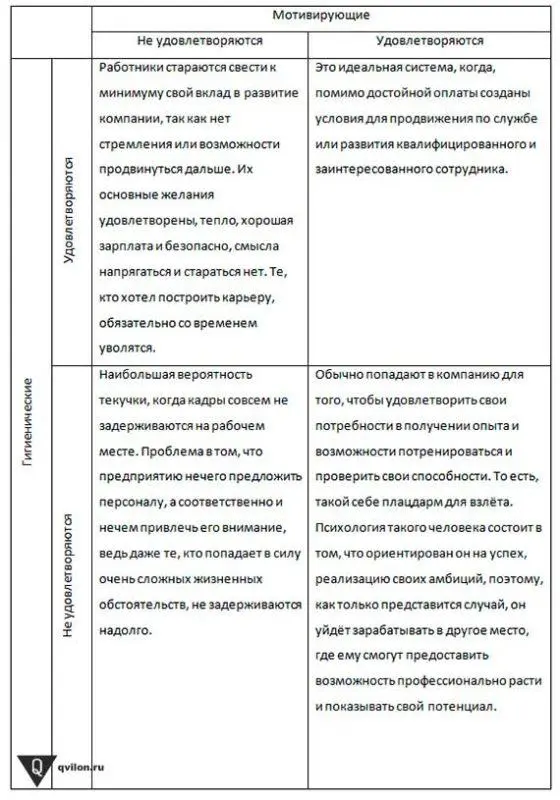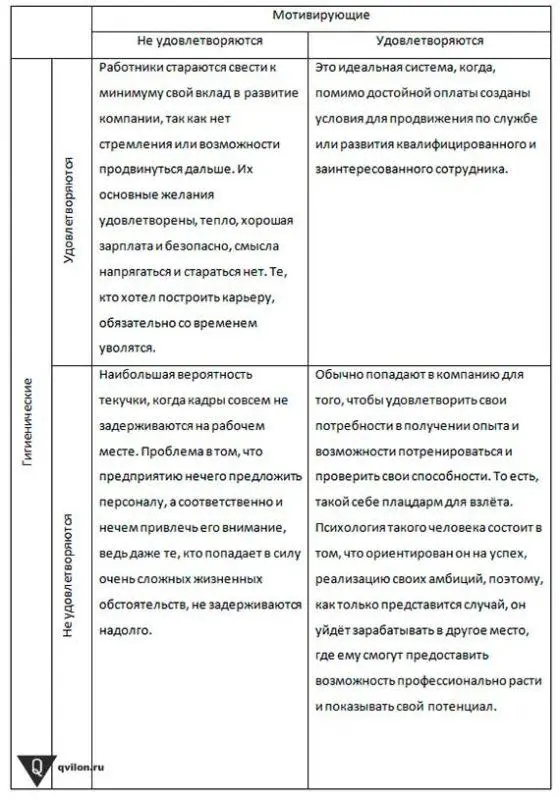Contents
Good day, dear blog readers! As you already know, motivation is the basis of successful performance, and there are many different theories about what kinds exist. And there are no ideal ones, each of them has its own advantages and disadvantages, you just need to use them depending on the circumstances. We have already looked at Abraham Maslow’s pyramid of needs in this article. Today, let’s go further to find out what the two-factor theory of Herzberg is.
Factors influencing activity
From the name it becomes clear that Frederick Herzberg invented it, in connection with the need to clarify what is the strength of the influence of material and non-material factors on employee motivation. Together with his colleagues, he once conducted a survey among the workers of a paint company. The purpose of this survey was to identify situations in which employees experienced an emotional upsurge and a desire to work, and in which, on the contrary, they experienced dissatisfaction and had to make efforts to force themselves to fulfill their duties.
According to the results of the survey, scientists came to the conclusion that motivation is influenced by motivating or hygiene factors, and at the same time they have a completely different effect on human activity. Frederick believed that the head of the company must first ensure a satisfactory level of hygienic factors, and only then move on to motivating ones.
So, directly more about them
1.Hygienic

They are related to the environment and are aimed at reducing dissatisfaction, and even better — eliminating it altogether. The name came from the word «hygiene», which means prevention, that is, health care. Let’s take a closer look at what exactly they include:
- Suitable and comfortable work schedule;
- Ensuring the safety of the conditions in which it is necessary to work;
- Ensuring regulatory conditions, such as humidity in the room, the presence of light or heat in the cool season;
- A social package that provides support in terms of compensation for any damage or incentives, in the form of benefits, vouchers or bonuses;
- Value for a manager who is interested in every employee;
- Of course, a decent salary, which is not motivating, but leading to satisfaction, or vice versa.
- Comfortable atmosphere in the team and in communication with the authorities;
- Additional control of the work performed;
- Timely replacement of equipment if it is out of order.
2. Motivating
They are aimed at satisfying more “higher” and spiritual needs, that is, to arouse the desire to work, to perform their duties well and efficiently, and also to strive for personal growth. These include:
- Activities that can arouse interest and excitement;
- Career advancement, or, for example, an increase in rank;
- Receiving recognition among colleagues, management and in general, in society. This helps to feel their own importance, as well as increase the level of self-esteem and self-esteem.
- Ability to be creative in solving problems;
- High responsibility for the result, which gives a sense of significance, both the work itself and the position held;
- The opportunity to observe the success that arose as a result of one’s own efforts.
Degree of influence
Herzberg also developed a theory of certain consequences that these factors entail as a result. I.e:

Recommendations

Herzberg’s content theory also includes certain recommendations that will help improve satisfaction with the process and conditions, both workers and superiors.
- First of all, the manager must himself understand the essence of the work, then he will better understand his employees, know how to influence their ability to work, and also increase the level of trust and respect towards him.
- Managers should not focus on creating conditions for development until they are sure that all hygiene needs are fully satisfied.
- It is very important that employees always receive feedback on the quality of their duties, whether it be praise, or focusing on an error. They must feel that there is control, and that it is fair, and all their achievements or failures do not go unnoticed and will have to be held accountable in any case.
- Also, so that they can independently choose a schedule, that is, allocate time and use it efficiently.
- To motivate a more serious attitude to their position, it is necessary to increase the financial responsibility of employees.
- I have already said that the microclimate in the team is important. This has a very positive effect on work efficiency if, in relations with superiors, subordinates feel the opportunity to communicate openly, talk about what they do not like or joke. At the same time, to have access to leaders of all levels, so as not to be afraid of their authoritarianism.
- It is necessary to create an environment in which employees can develop and increase their self-esteem, receiving periodic recognition and self-respect.
Although Herzberg claims to have improved Abraham Maslow’s pyramid of needs, adapting it for business and applying it to work motivation, there are still many shortcomings. Because of this, it cannot be used as a full-fledged model for regulating the process of successful activity. But as one of the tools, I think that it should be used.
Conclusion
I also recommend studying the article about the 14 principles of Tao Toyota. From which you will learn how the philosophy of production is built, one of the most powerful companies in the world.
And that’s all for today! Subscribe to the blog to be aware of new interesting articles that will help you on the path of self-development.









